Thursday, November 30, 2006
Congress To Avoid Intelligence Oversight Fix

It was a stupid promise to make in the first place, the 9/11 Commission being the whitewash that it was. But this recommendation actually made some sense.
That's why they are not going to enact it.
It was a solemn pledge, repeated by Democratic leaders and candidates over and over: If elected to the majority in Congress, Democrats would implement all of the recommendations of the bipartisan commission that examined the attacks of Sept. 11, 2001.
But with control of Congress now secured, Democratic leaders have decided for now against implementing the one measure that would affect them most directly: a wholesale reorganization of Congress to improve oversight and funding of the nation's intelligence agencies. ...
It may seem like a minor matter, but members of the commission say Congress's failure to change itself is anything but inconsequential. In 2004, the commission urged Congress to grant the House and Senate intelligence committees the power not only to oversee the nation's intelligence agencies but also to fund them and shape intelligence policy. The intelligence committees' gains would come at the expense of the armed services committees and the appropriations panels' defense subcommittees. Powerful lawmakers on those panels would have to give up prized legislative turf.
But the commission was unequivocal about the need.
"Of all our recommendations, strengthening congressional oversight may be among the most difficult and important," the panel wrote. "So long as oversight is governed by current congressional rules and resolutions, we believe the American people will not get the security they want and need."
Now Democrats are balking, just as Republicans did before them. ...
(B)ecause the panels do not control the budget, intelligence agencies tend to dismiss them.
"The person who controls your budget is the person you listen to," (Thomas H. Kean (R), the 9/11 commission's co-chairman) said.
Those people, the appropriators, do not seem to care much, he said. The intelligence budget is a small fraction of the nearly $500 billion overseen by the armed services committees and the appropriations panels' defense subcommittees. Kean said that Sen. John McCain (R-Ariz.), an Armed Services Committee member, told the Sept. 11 commission that if his panel spends 10 minutes considering the intelligence budget, it has been a good year.
Wrongful Arrest in "Terror" Case Settled

"War on Terror" run amok.
The U.S. government agreed yesterday to pay $2 million to settle a lawsuit filed by an Oregon lawyer who was arrested and jailed for two weeks in 2004 after the FBI bungled a fingerprint match and mistakenly linked him to a terrorist attack in Spain.
Under the terms of the settlement filed yesterday in U.S. District Court in Portland, the government also issued an unusual apology to Brandon Mayfield for the "suffering" caused by his wrongful arrest and imprisonment. It acknowledged that the ordeal was "deeply upsetting" to Mayfield and his family.
Mayfield will be able to continue pursuing his legal challenge to the constitutionality of the USA Patriot Act anti-terrorism law, which was used to obtain his personal records while he was under investigation.
The payment is a clear embarrassment for the FBI, which arrested Mayfield as a material witness in May 2004. FBI examiners had erroneously linked him to a partial fingerprint on a bag of detonators found after terrorists bombed commuter trains in Madrid in March, killing 191 people. The bureau compounded its error by stridently resisting the conclusions of the Spanish National Police, which notified the FBI three weeks before Mayfield was arrested that the fingerprint did not belong to him.
Mayfield's lawsuit alleged that his civil rights had been violated and that he was arrested because he is a Muslim convert who had represented some defendants in terrorism-related cases. ...
The case has become a potent symbol for civil liberties advocates who argue that it shows how easily the government can abuse its powers to detain alleged terrorism suspects under relaxed standards of probable cause.
Mayfield said in a statement yesterday that he was threatened with the death penalty while in custody, that he and his family were targeted "because of our Muslim religion," and that he looks forward "to the day when the Patriot Act is declared unconstitutional."
Wednesday, November 29, 2006
Executive Order on Support of Terrorism Ruled Unconstitutional

A federal judge in Los Angeles has ruled that the Bush administration violated the Constitution when it froze the assets of more than two dozen alleged terrorist groups after the Sept. 11 attacks.
U.S. District Judge Audrey B. Collins, in a ruling released Monday, held that an executive order Bush issued Sept. 24, 2001 -- designating 27 groups and individuals as "specially designated global terrorists" -- was "unconstitutionally vague."
Collins said the order was flawed because it failed to explain the criteria used to make the designations and because it included no process to challenge the decision.
"The president's designation authority is subject only to his unfettered discretion," the judge said.
The ruling came in a long-running lawsuit before Collins in which humanitarian groups are seeking to support the nonviolent work of two groups that the secretary of State has designated as terrorist: the Kurdistan Workers Party, the main Kurdish political party in Turkey; and the Liberation Tigers of Tamil Eelam, a rebel group fighting for a separate homeland for Tamils in Sri Lanka.
Earlier in the case, Collins struck down portions of a law that made it a felony to provide "material support" to terrorists, saying that language in the Patriot Act, which had amended the law, was ill-defined. The Justice Department has often used the material support law in prosecuting terrorist cases.
The latest case focuses on Executive Order 13224, which is aimed at cutting off financing to alleged terrorist groups and is based on the 1977 International Emergency Economic Powers Act. Twenty-seven groups and individuals were initially named as "specially designated global terrorists" under the order -- including the PKK and the Tamil Tigers -- and hundreds more since have been added to the list.
In her ruling, Collins said the order is unconstitutional because there is "no apparent limit" on presidential authority to designate groups or individuals as terrorists. In addition, the judge ruled, language banning those "otherwise associated" with such groups is "unconstitutionally vague on its face." Collins rejected a number of other claims by the plaintiffs, however, including that the order's definition of a terrorist group is too vague.
Supreme Court To Hear EPA Auto Emissions Regulation Case

The Supreme Court will hear a case today brought by Massachusetts and 11 other states that contend the federal Environmental Protection Agency has ignored its legal responsibility to set limits on car and truck emissions, which scientists say are among the leading contributors to global warming. ...
Both sides agree that the case will put what is arguably the country's most important environmental issue in the hands of the high court, say state officials and environmentalists. It also could jump-start the deadlocked federal debate on climate change. ...
At issue is the interpretation of Section 202 of the Clean Air Act, a law that gives the federal government the power to control sources of air pollution. Environmentalists have alleged that the Bush administration has systematically tried to weaken the act to benefit polluters.
The section in question states that the federal government must regulate "any air pollutant" that can "reasonably be anticipated to endanger public health or welfare."
The states and the environmentalists say the EPA, as the chief enforcer of the Clean Air Act, is clearly responsible for regulating carbon dioxide emissions. Because cars, trucks, and power plants are the biggest producers of those emissions, they argue, the EPA must step in, set, and enforce pollution limits.
But the EPA, backed by the White House, said it is improper to regulate greenhouse gas emissions without a better understanding about global warming. The administration points to a study by the National Research Council , which advises the White House on scientific issues. The study concludes that any link between greenhouse gas emissions and global warming "cannot be unequivocally established."
Tuesday, November 28, 2006
Justice Dept Announces Potemkin Investigation Of Extra-Legal NSA Program
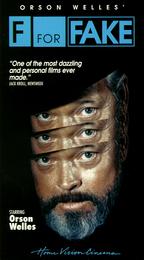
The administration's horse-hockey about being allowed to violate a duly enacted statute (FISA) simply because "the terr'sts hit Merka on 9-11" has been wearing very thin.
Now, the Justice Department is going to examine -- not the illegality of the extra-legal NSA warrantless eavesdropping program -- but only how the intelligence yield has been dealt with by the Justice Department itself.
And I have doubts whether they will be dealing with all the facts relevant to their limited mandate either.
The Justice Department's inspector general yesterday announced an investigation into the department's connections to the government's controversial warrantless surveillance program, but officials said the probe will not examine whether the National Security Agency is violating the Constitution or federal statutes. ...
The "program review" will examine how the Justice Department has used information obtained from the NSA program, as well as whether Justice lawyers complied with the "legal requirements" that govern it, according to Fine's letter. Officials said the review will not examine whether the program itself is legal. ...
Several ... House Democrats said the inquiry should be broadened to include the questions of whether the program violated federal laws and how it was approved. Rep. Maurice D. Hinchey (D-N.Y.) also said he is "skeptical about the timing" of the announcement.
"I wonder whether this reversal is only coming now after the election as an attempt to appease Democrats in Congress who have been critical of the NSA program and will soon be in control and armed with subpoena power," Hinchey said in a news release.
Of course, this being Washington, one can expect some Democrats to collaborate with the administration's agenda:
The probe comes as a newly active presidential civil liberties board received its first detailed briefing about the NSA program. The Privacy and Civil Liberties Oversight Board, which was established by Congress and whose five members were appointed by Bush, was provided details about the workings of the NSA program last week.
One member, Lanny J. Davis, a White House lawyer in the Clinton administration, said in an interview that he was "pleasantly surprised" by the privacy protections built into the program. He declined to discuss the program in detail because of secrecy restrictions.
"I was astonished at the extent to which they are all concerned about the legal and civil liberties and privacy implications of what they were doing," Davis said. "It was a constant theme of concern, awareness and training way beyond what I expected."
Davis said the briefings convinced him that the program had been carefully constructed from the start. "It was clear that as they thought about it, they put it together in a way that minimized problems to the best extent that they could," he said.
This is a "Potemkin" investigation being conducted for the purpose of providing congressional Democrats (and the American public) the illusion that their concerns about the program's constitutional violations are being addressed.
Monday, November 27, 2006
Cheney And The Imperial Presidency

In July 1987, then-Representative Dick Cheney, the top Republican on the committee investigating the Iran-contra scandal, turned on his hearing room microphone and delivered, in his characteristically measured tone, a revolutionary claim.
President Reagan and his top aides, he asserted, were free to ignore a 1982 law at the center of the scandal. Known as the Boland Amendment, it banned US assistance to anti-Marxist militants in Nicaragua.
"I personally do not believe the Boland Amendment applied to the president, nor to his immediate staff," Cheney said.
Most of Cheney's colleagues did not share his vision of a presidency empowered to bypass US laws governing foreign policy. The committee issued a scathing, bipartisan report accusing White House officials of "disdain for the law."
Cheney refused to sign it. Instead, he commissioned his own report declaring that the real lawbreakers were his fellow lawmakers, because the Constitution "does not permit Congress to pass a law usurping Presidential power."
The Iran-contra scandal was not the first time the future vice president articulated a philosophy of unfettered executive power -- nor would it be the last. The Constitution empowers Congress to pass laws regulating the executive branch, but over the course of his career, Cheney came to believe that the modern world is too dangerous and complex for a president's hands to be tied. He embraced a belief that presidents have vast "inherent" powers, not spelled out in the Constitution, that allow them to defy Congress.
Cheney bypassed acts of Congress as defense secretary in the first Bush administration. And his office has been the driving force behind the current administration's hoarding of secrets, its efforts to impose greater political control over career officials, and its defiance of a law requiring the government to obtain warrants when wiretapping Americans. Cheney's staff has also been behind President Bush's record number of signing statements asserting his right to disregard laws.
A close look at key moments in Cheney's career -- from his political apprenticeship in the Nixon and Ford administrations to his decade in Congress and his tenure as secretary of defense under the first President Bush -- suggests that the newly empowered Democrats in Congress should not expect the White House to cooperate when they demand classified information or attempt to exert oversight in areas such as domestic surveillance or the treatment of terrorism suspects.
Peter Shane, an Ohio State University law professor, predicted that Cheney's long career of consistently pushing against restrictions on presidential power is likely to culminate in a series of uncompromising battles with Congress.
"Cheney has made this a matter of principle," Shane said. "For that reason, you are likely to hear the words 'executive privilege' over and over again during the next two years."
No Conciliation Likely From GOP

The GOP is debating among itself how to play their cards as the minority when the 110th Congress convenes in early January.
Mr. Norquist has argued that Mr. Bush should forget about striking any such deals, and should instead work to defeat the Democrats in 2008 and usher in a new Republican Congress that will finish what the president has tried to start.
Throughout the campaign year, Mr. Rove argued that Republican losses this year would register as only a blip in what he maintained was a continued conservative march toward a sustained Republican governing majority.
Republicans close to the White House said Mr. Rove was already arguing that Mr. Bush should move to bolster his support with conservatives, who make up his base and will compose a greater proportion of the Republican Congressional caucus after an election in which many moderate Republicans lost their seats, some to conservative Democrats.
And the talk among both Democrats and Republicans on Capitol Hill is about the potential for Mr. Bush to build a coalition that includes those new, conservative Democrats, though one Democratic leadership aide, speaking on condition of anonymity to break from a public face of conciliation, said, "Crossing party lines has been antithetical to anything he's done so far."
The White House will certainly dig in hard when it comes to Congressional efforts to investigate Mr. Bush's national security programs. Vice President Dick Cheney has vowed to rebuild executive power lost since Watergate and is unlikely to drop that effort -- in the form of greater Congressional consultation on secret national security issues -- because of one lost election.
If anything, Democrats have taken Mr. Bush's first moves since this month's election as more provocative than conciliatory. He plans to use the lame-duck Republican Congress to push domestic wiretapping legislation that Democrats overwhelmingly oppose; he is pushing for the confirmation of his ambassador to the United Nations, John R. Bolton, whose continued service most Democrats, not to mention some Republicans, oppose; and he has resubmitted the names of several conservative justices for the federal bench whom Democrats have rejected once already.
Sunday, November 26, 2006
GOP Will Face New Challenges in 2008 Congressional Races

From Zachary A. Goldfarb in the Washington Post:
As the 2006 congressional campaign fades from memory, the 2008 Republican campaign to retake the House and Senate will get underway in coming months.
This year, scandal and a strong anti-GOP tide were fortuitous forces for Democrats, who picked up seats that were squarely in Republican territory. Those seats are likely to be top prospects for Republicans to recapture in 2008.
In contrast, Democratic gains in swing districts in the Midwest and Democratic-leaning districts in the Northeast will be much tougher for Republicans to seize.
Target No. 1 for the GOP may well be Tom DeLay's old district in Texas. Former majority leader DeLay resigned earlier this year amid campaign finance charges, and courts said the GOP could not name a replacement on the ballot.
In a district where President Bush got 65 percent of the vote in 2004 some believed Shelley Sekula-Gibbs, the Republican write-in candidate, could eke out a victory against Democrat Nick Lampson, but Lampson won.
Similarly, Republicans will probably target former representative Mark Foley's district in Florida. His safe seat turned into a tossup after Foley resigned in the page scandal that consumed Washington in the last part of the campaign. There was not enough time for the Republicans to name a replacement candidate on the ballot, according to Florida law, and Democrat Tim Mahoney won against Joe Negron, the Republican stand-in, in a close race.
Other scandal-plagued seats Republicans may target in 2008 include former representative Robert W. Ney's Ohio district and Rep. Don Sherwood's Pennsylvania district. Other heavily Republican seats captured by the Democrats include two in Indiana, one in Kansas and one in North Carolina.
But even if Republicans were to take back these seats, they would have to win about six others to take the House in 2008 -- and those six are not so clear. The Democrats will have roughly a 14-seat advantage in the House.
On the Senate side, the GOP faces more trouble. The Republicans need at least one seat -- and maybe two, depending on who wins the presidential race -- to take back the upper chamber. But while 12 Democrats are up for reelection in 2008, 22 Republicans are.
Only a few Democrats and Republicans, however, are considered vulnerable. Still, Republicans could be buffeted by a string of retirements that would make the field more competitive. As of now, the two most vulnerable Democratic senators appear to be Tim Johnson (S.D.) and Mary Landrieu (La.), while the most vulnerable Republicans are Wayne Allard (Colo.), Norm Coleman (Minn.) and John E. Sununu (N.H.).
Saturday, November 25, 2006
Downplaying The NSA Warrantless Eavesdropping Program

In a speech last week, Attorney General Alberto R. Gonzales labeled as "myth" the idea that the (NSA warrantless surveillance) program "is an invasion of privacy and an unlawful eavesdropping tool." The program, he said, "does not invade anyone's privacy, unless you are talking to the enemy in this time of war." ...
Representative Nancy Pelosi of California, who will take over as House speaker in January, favors an investigation to determine how the security agency's program actually operated and what its legal framework is under the Foreign Intelligence Surveillance Act of 1978, a senior aide to Ms. Pelosi said. Administration officials said they were concerned they could have to shut down a program they deemed vital to national security.
The 1978 law requires counterterrorism officials to obtain court orders to eavesdrop on people inside the United States. But the security agency's program involved eavesdropping without warrants on the international telephone and e-mail communications of Americans and others in this country suspected of links to Al Qaeda and other terrorist groups.
One can understand why Attorney General Gonzales would make his outrageous claim -- he was among those who approved the unlawful evasion of FISA.
But the New York Times -- which broke the story of the extra-legal warrantless eavesdropping program -- knows full well that the international communications of everyone in the USA are being harvested for data mining. Not just "Americans and others in this country suspected of links to Al Qaeda and other terrorist groups."
They shouldn't attempt to put lipstick on a pig.
Thursday, November 23, 2006
William S. Burroughs - Thanksgiving Prayer
Wednesday, November 22, 2006
New Army Recruiting Slogan

The Army, facing another tough recruiting season, launched a $200 million-a-year advertising campaign this month and unveiled a new slogan: "Army Strong."
The campaign's core message is that the Army builds not only physical but also mental and emotional strength in recruits, bonding them into a powerful, close-knit team.
"There's strong, and then there's Army strong," a deep male voice intones as martial music rises from a brass band in the background. ...
Army officials acknowledge that parents and other influential adults are less likely to recommend military service today because of the ongoing conflicts, and surveys have shown that the wars have made some young people more wary of enlisting.
To address these concerns, two of the ads feature the parents of soldiers -- a farming couple and a mechanic and his wife -- whose worries about Army service evolve into pride. "I was pretty nervous, apprehensive," says the father, wearing a 1st Infantry Division cap and standing beside a cornfield.
"If your son or daughter wants to talk with you about joining the Army, listen. You made them strong, we'll make them Army strong," the announcer says in the English and Spanish ads launched on MTV, the History Channel, the Discovery Channel and other stations. ...
Asked how they felt about the "Army Strong" pitch, soldiers at the Pentagon had mixed reactions. "I like it because it gives a better picture of what the Army is," said Lt. Col. Wayne Cherry, a liaison officer for the Army's chief of staff. " 'Army Strong' is like a football team, a baseball team."
Sgt. 1st Class Mark Johnson was less enthusiastic. " 'Army Strong' is not telling me anything. It doesn't touch any emotional string," he said. "I don't think it will inspire people."
Tuesday, November 21, 2006
GOP Leaders Not Pushing White House Agenda In Lame Duck Session

In a move that has infuriated Republican appropriators, GOP congressional leaders have decided to punt their annual spending bills until next year, when Democrats assume control of both chambers, according to numerous Republican aides.
The decision was expected and is a further indication that congressional Republicans will not address any of the White House's legislative priorities before ceding control next year.
Within the last week, Vice President Cheney and Attorney General Alberto Gonzales have urged Congress to move an update of the administration's controversial domestic surveillance program, but there has been little activity to meet that goal since members returned from the watershed election.
A federal judge's decision over the summer to invalidate the administration's wiretapping of overseas calls to suspected terrorists has forced the administration to negotiate with congressional leaders to continue the eavesdropping program.
Relations between the White House and Republicans on the Hill have been strained since the election, which further complicates the negotiations between Republicans in the House and Senate on the contentious bill because members are less motivated to give the administration a win.
President Bush urged Congress to pass a Vietnam trade bill before his trip there this past weekend, but after the measure failed in the House, congressional leaders did little to revive the legislation, which attracted the backing of Democratic leaders, including House Minority Leader Nancy Pelosi (D-Calif.)
The expected decision to postpone consideration of the remaining spending bills, which was finalized late last week, angered appropriators in both chambers who worked hard to finish their bills on time this year.
House Speaker Dennis Hastert (R-Ill.), Senate Majority Leader Bill Frist (R-Tenn.), House Majority Leader John Boehner (R-Ohio) and Senate Majority Whip Mitch McConnell (R-Ky.) met with the two appropriations chairmen, Sen. Thad Cochran (R-Miss.) and Rep. Jerry Lewis (R-Calif.), last Friday to break the bad news, aides said yesterday.
"Senator Cochran thinks it's completely irresponsible that the responsibilities of this Congress have been abdicated for the year," Cochran spokeswoman Jenny Manley said.
Monday, November 20, 2006
Fox News Channel Planning To Air Conservative "Daily Show" Knockoff

Fox News Channel might air two episodes of a "Daily Show"-like program with a decidedly nonliberal bent on Saturday nights in late January, with the possibility that it could become a weekly show for the channel.
The half-hour show is executive produced by "24's" Joel Surnow and Manny Cota and creator Ned Rice, who previously wrote for "Politically Incorrect" and "Late Late Show With Craig Ferguson" through This Just In Prods. It would take aim at what Surnow calls "the sacred cows of the left" that don't get made as much fun of by other comedy shows.
"It's a satirical news format that would play more to the Fox News audience than the Michael Moore channel," Surnow said. "It would tip more right as 'The Daily Show' tips left."
The show was pitched as "This Just In" when it first got life as a 20-minute pilot presentation for Fox Broadcasting Co.'s late-night division. But when that network passed, Surnow said it attracted the attention of Fox News Channel chief Roger Ailes.
"I showed it to Roger, and he really liked it and thought it could work on Fox News if we could make it conform to some of the restraints" of a cable news channel. Fox News Channel confirmed that talks were going on.
Saturday, November 18, 2006
2006 Electronic Election Skullduggery Alleged
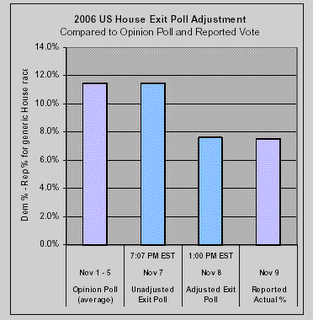
Election Defense Alliance, a national election integrity organization, issued an urgent call today for an investigation into the 2006 election results and a moratorium on deployment of all electronic voting equipment after analysis of national exit polling data indicated a major undercount of Democratic votes and an overcount of Republican votes in congressional races across the country. These findings are an alarming indictment of the American election system in which 80% of voters used electronic voting equipment.
As in 2004, the Exit Poll and the reported election results do not add up. But this time there is an objective yardstick in the methodology that establishes the validity of the Exit Poll and exposes the inaccuracy of the election returns. These findings are detailed in a paper published today on the EDA website.
The Edison-Mitofsky media Exit Poll, posted Election Night on CNN.com, had a sample base of more than 10,000 voters, and showed Democratic House candidates winning over Republicans by an 11.5 percent margin.
The reported vote count showed Democrats winning by a 7.6 margin, 3.9 percent less than the Exit Poll and far outside the poll's +/-1-percent margin of error. This discrepancy entailed at least 3,000,000 votes.
The Exit Poll was then adjusted, by a process known as "forcing," to match reported election vote totals. The final result, posted at 1:00 p.m. November 8, showed Democrats winning by a 7.6 percent margin, exactly mirroring the reported vote totals.
The objective yardstick was the proportion of respondents who indicated they had voted for Bush or Kerry in 2004. The sample in the already weighted Election Night Exit Poll had 47 percent Bush voters and 45 percent Kerry voters, a valid sample given the very conservative assumption that Republicans and Democrats turned out with equal enthusiasm in 2006. However, after the forcing process, the sample contained 49 percent Bush voters and only 43 percent Kerry supporters. This 6 percent gap is more than twice the size of the 2004 Bush win of 2.8 percent. It indicates a significant over-sampling of Republican voters in the adjusted 2006 Exit Poll.
Such a gross oversample of Republicans was necessary to match the actual vote counts, which therefore could not have been an accurate count of the actual electorate. Had the intended votes been accurately tallied, this election would have produced a Democratic landslide of epic proportions.
Friday, November 17, 2006
Where Have We Heard This Idea Before?
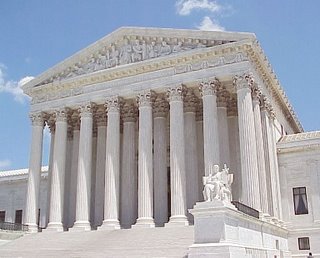
Right out of Ann Coulter's playbook.
A discussion of recent threats to judges' safety, at a bar association conference in suburban Dallas last week, became startlingly specific when Sandra Day O'Connor, the retired Supreme Court justice, recounted that each justice had received in the mail "a wonderful package of home-baked cookies" that contained "enough poison to kill the entire membership of the court."
Justice O'Connor's remarks were reported on Thursday in The Star-Telegram in Fort Worth.
Although the episode was not publicly disclosed when it occurred in April 2005, it had a public, although little-noticed, denouement last month when the sender of the poisoned cookies was sentenced in federal court here to 15 years in prison.
The sender, Barbara Joan March of Bridgeport, Conn., pleaded guilty to 14 counts of "mailing injurious articles." The 14 recipients included the nine justices; the chiefs of staff of the Army, Navy, and Air Force; and the director and deputy director of the Federal Bureau of Investigation. The packages, containing either candy or baked goods, were laced with rat poison.
All mail received at the Supreme Court is screened, and the tainted packages never reached the justices, said Kathleen Arberg, the court's public information officer. The danger posed by the packages was immediately apparent. Each contained a typewritten letter stating either, "I am going to kill you," or, "We are going to kill you," and adding, "This is poisoned."
The letters carried various return addresses of people who had earlier connections with Ms. March, including seven who attended college with her. The F.B.I. determined that Ms. March wrote and sent the letters, typing a number of them on a typewriter at a public library near her home.
What Happened To Sekula-Gibbs' Missing Computer Files?
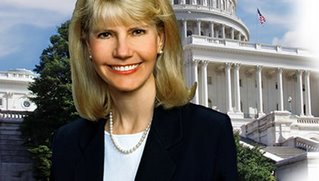
Just when it seemed things could get no stranger regarding the House seat once held by Texas Republican Tom DeLay, his successor called for an investigation into missing computer records last night, and an aide accused her of "disrespect and unprofessionalism."
Rep. Shelley Sekula-Gibbs (R-Tex.), who is warming the 22nd District seat for only a few weeks, said that former DeLay employees apparently deleted the office's computer files shortly before they walked out, en masse, on Tuesday. ...
David James, DeLay's former chief of staff, who stayed to work for Sekula-Gibbs -- until Tuesday's walkout -- said last night that the office computers "were scrubbed and reconfigured by an outside vendor in the days immediately prior to her assuming office," as House policies require. The new congresswoman was given a copy of everything "electronically or in hard copy, or both," James said in a statement.
DeLay, facing indictment in Texas, resigned from his House seat in June, triggering two elections on Nov. 7 in his Houston area district. The first, won by Sekula-Gibbs, was a special election to complete his term in the 109th Congress, which will adjourn next month. The other, won by Democrat Nick Lampson, is for the full two-year term of the 110th Congress, which convenes in January. ...
James and half a dozen other former DeLay staffers were on board to help Sekula-Gibbs finish the 109th Congress's business. But they abruptly left their posts Tuesday, during her open house celebration. Sekula-Gibbs said she has no idea why they left. But James said in his statement: "Never has any member of Congress treated us with as much disrespect and unprofessionalism as we witnessed during those five days."
Thursday, November 16, 2006
Majority Leader Battle To Be Resolved By Secret Vote Today
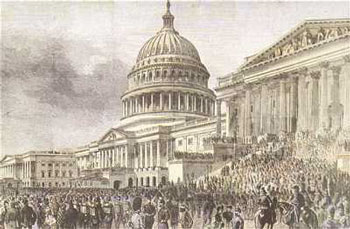
One is an old bull of the Democratic Party dogged by charges of ethical missteps, and the other raised prodigious sums for colleagues to put his leadership campaign over the top.
Today's election for House majority leader pits Rep. John P. Murtha, the longest-serving member of Congress from Pennsylvania and an icon of Iraq war opponents, against Rep. Steny H. Hoyer of Maryland, a polished political operative who is also the party's biggest fund-raiser.
While the tussle is unlikely to derail the Democrats' program, it has cast a pall over their post-election euphoria and become a public relations setback for the likely next House speaker, Nancy Pelosi of California.
"It is very surprising that on the heels of this big election victory the Democrats are having a leadership fight," said Darrell West, a political science professor at Brown University. "You would think they would want to present a united front. It is embarrassing." ...
Though he is a social conservative who opposes abortion, Murtha's reputation soared among liberal Democrats when he challenged the Bush administration's Iraq policy.
That Murtha is a decorated Vietnam War veteran with close ties to the Pentagon bolstered his credibility to make the antiwar case. Both of the Philadelphia area's new congressional Democrats, Joe Sestak and Patrick Murphy, say they will vote for Murtha for the No. 2 position in the House leadership.
"He's the dean of the Pennsylvania delegation, and I very much respect his position, which is one of moral courage, on Iraq," Sestak said.
Hoyer, the Democratic whip, currently serves as Pelosi's No. 2. Although Hoyer and Pelosi have clashed in the past, Hoyer spent much of the election season raising $2 million for fellow House Democratic candidates, according to the campaign analysis firm of Dwight L. Morris & Associates. ...
"I think we're in very good shape. I expect to win," Hoyer said Wednesday. "I expect that we will bring the party together and become unified and move on from this."
With characteristic gruffness, Murtha said the opposite was true. "We're going to win. We got the votes," he said on MSNBC.
Allies such as Miller have been working this week to peel away votes from Hoyer. Pelosi also has intervened more directly, making the case for Murtha in one-on-one meetings with Democratic freshmen, sessions in which the incoming lawmakers ask for all-important committee assignments. ...
Although the main focus has been on the nasty sniping between Murtha and Hoyer, the unspoken story is the long-simmering rivalry between Pelosi and Hoyer. The two have known each other more than 40 years -- since, as young, ambitious Maryland natives, they interned for then-Sen. Daniel B. Brewster.
At one time they were friends, but their ambitions eventually put them on a collision course. Pelosi nominated Hoyer in a 1991 House leadership race and was one of his lieutenants. But in 2001, the two ran against each other in a protracted and nasty race for minority whip. Pelosi won handily, but her allies charge that Hoyer never stopped running for the next prize and along the way tried to undercut her authority. Hoyer has said he has never been anything but supportive of Pelosi.
For the most part, lawmakers, Hill aides and some outside advisers -- even some close to her -- say they are at a loss to explain why Pelosi has held a grudge for so long, because she clearly has the upper hand as leader of the House Democrats.
Wednesday, November 15, 2006
Large Undervote in Florida District

A circuit court judge Tuesday temporarily postponed a state audit of touch-screen voting machines that reported about one in eight voters did not vote in a U.S. House contest.
That rate was much higher than found in neighboring counties, and the reason for the large undervote -- more than 18,000 votes -- remains unclear.
The order by Sarasota Circuit Judge Deno Economou does not halt a recount set to begin Thursday in the 13th Congressional District race between Vern Buchanan (R) and Christine Jennings (D). ...
Buchanan leads Jennings by 377 votes -- about 0.2 percent.
Both candidates are in Washington for congressional orientation this week.
In the electronic recount, Sarasota elections supervisor Kathy Dent expected it to be finished late Tuesday. But she expected other recount activities to continue right up to Saturday's state-mandated results deadline. The recount involves precincts in five counties.
The race is for the seat held by U.S. Rep. Katherine Harris, who rose to national attention during Florida's 2000 recount that put the governor's brother, George W. Bush, in the White House. Harris, a Republican, was the secretary of state at the time, and ultimately certified Bush the winner.
Tuesday, November 14, 2006
Judith Miller and Interrogation Center Activity
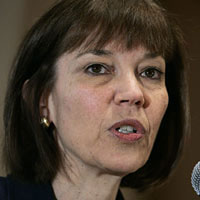
Ms. Miller has an interesting propensity to attend interrogations in Middle-East hotspots.
Former New York Times journalist Judith Miller told a federal court jury Monday how she secretly witnessed the 1993 interrogation by Israeli agents of a Palestinian-American grocer charged with providing money and recruits to a terrorist group.
Miller, who was Cairo bureau chief of The New York Times at the time, said Muhammad Salah's lawyer told her that he had been tortured by Israeli agents at the interrogation center but she saw no evidence of that.
"He was boasting, he was jaunty, there was no reason to believe that he had been subjected to that kind of treatment," Miller testified.
Salah, 53, and former university professor Abdelhaleem Ashqar, 48, are charged in a federal racketeering indictment with providing money and fresh recruits to the Islamic militant group Hamas in its campaign to topple the Israeli government.
The two men say they merely were trying to help impoverished Palestinians suffering under the Israeli army's occupation of the West Bank and Gaza Strip. They deny that they are Hamas members or support any form of terrorism.
Salah was arrested in Israel in January 1993 and served four and a half years in Israeli prisons before his release and return to Chicago.
He claims that he was deprived of sleep, hooded and forced to sit in a tiny chair with his hands cuffed behind his back before he made a series of statements to agents of the Shin Bet, the Israeli security agency.
Shin Bet interrogators using aliases and testifying before a courtroom cleared of spectators have said that Salah's statements were made voluntarily. ...
She testified that she flew to Israel in 1993 after reading about Salah's arrest and contacted aides to Israeli Prime Minister Yitzak Rabin, whom she described as a longtime friend.
Through Rabin and Shin Bet chief Yakov Perry, she was invited to visit the interrogation center in Ramallah provided that she would not reveal in any article she wrote that she had been there and seen Salah questioned. ...
Miller said she was taken to the interrogation center because the Israelis wanted her to write about Salah. He allegedly had already confessed that money to finance Hamas was coming out of the United States and Israeli officials wanted to draw U.S. attention to that. ...
Defense attorneys repeatedly tried to portray her as biased in favor of Israel. "Have you ever been used as a Mossad asset?" asked Salah attorney Michael Deutsch, referring to the Israeli intelligence service.
"No," Miller said. She left the courthouse in the company of a lawyer, refusing to stop to answer questions from reporters.
This is the same Judith Miller who testified to the "Plamegate" grand jury that she held a U.S. government security clearance, and who participated in U.S. military interrogation activities in Iraq.
I don't think that Salah's attorney asked the right question.
Monday, November 13, 2006
House Democrats' Leadership Battles

Steny Hoyer says he has the votes, despite Pelosi's efforts.
House Speaker-to-be Nancy Pelosi (D-Calif.) endorsed Rep. John P. Murtha (D-Pa.) yesterday as the next House majority leader, thereby stepping into a contentious intraparty fight between Murtha and her current deputy, Maryland's Steny H. Hoyer.
The unexpected move signaled the sizable value Pelosi gives to personal loyalty and personality preferences. Hoyer competed with her in 2001 for the post of House minority whip, while Murtha managed her winning campaign. Pelosi has also all but decided she will not name the ranking Democrat on the House intelligence committee, Rep. Jane Harman (D-Calif.) to chair that panel next year. ...
(I)n her first real decision as the incoming speaker, Pelosi said she was swayed by Murtha's early stance for a withdrawal of U.S. forces from Iraq. Her letter of endorsement yesterday made clear that she sees Iraq as the central issue of the next Congress and that she believes a decorated Marine combat veteran at the helm of the House caucus would provide Democrats ammunition in their fight against congressional Republicans and President Bush on the issue. ...
Pelosi's decision could be a significant blow to Hoyer, who has worked for years to move up in the Democratic leadership. Political handicappers had regarded Hoyer to be the strong favorite when House Democrats meet Thursday to choose a majority leader for the 110th Congress. Although Murtha's stance on Iraq has made him a hero among many grass-roots party activists, his positions against abortion and gun control have pushed many House liberals into Hoyer's camp, including the leader of the Out of Iraq Caucus, Rep. Maxine Waters (D-Calif.). ...
Hoyer also has the strong support of many of the party's conservative "Blue Dog" Democrats, who worry about Murtha's involvement in the Abscam bribery sting in 1980 and what they see as his freewheeling style on the House Appropriations Committee, where he has openly advocated for the interests of his district and his political supporters. ...
Another potentially fractious vote in the House Democratic Caucus was settled late last week when Rep. Rahm Emanuel (D-Ill.), the outgoing chairman of the Democratic Congressional Campaign Committee, decided against running for House majority whip. Rep. James Clyburn (D-S.C.), the only African American in the House Democratic leadership, had already announced his candidacy.
Emanuel instead will stand unopposed for the job Clyburn will vacate, House Democratic Caucus chairman. In his announcement, he appealed for party unity ahead of Thursday's leadership elections.
Sunday, November 12, 2006
Friends In High Places
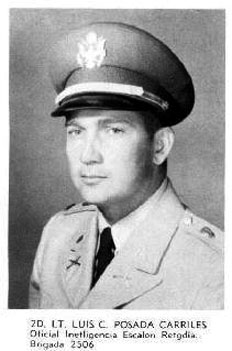
A.L. Bardach on the political skullduggery surrounding the case of Luis Posada Carriles:
Not long after Posada's arrest, FBI and Homeland Security agents began to phone me, seeking information about the New York Times series. One agent came right out and asked if I'd share my research materials -- as well as my copies of FBI and CIA files on Posada. "Do us a favor," he said. "We can't find ours." I laughed politely, assuming it was a strained attempt at humor. But he wasn't kidding.
In August 2003, the Miami bureau of the FBI made the startling decision to close its case on Posada. Subsequently, according to FBI spokeswoman Judy Orihuela, several boxes of evidence were removed from the bureau's evidence room, or the "bulky," as it is known. Among the documents that disappeared was the original signed fax that Posada had sent to collaborators in Guatemala in 1997, complaining of the U.S. media's reluctance to believe reports about a series of bombings in Cuba, which he hoped would scare tourists and investors away from Castro's island. ...
Posada fretted to me that the fax could cause him problems with the FBI. But he had no need to worry.
Hector Pesquera, the special agent in charge of the Miami FBI bureau at the time, showed little interest in Posada's case. To his agents' distress, he enjoyed socializing with Miami's hard-line exile politicians, and denied agents' requests for wiretaps on Bosch, known as the godfather of the paramilitary groups, as well as other militants suspected of ongoing criminal activity. Pesquera shuttered investigations into exile militants, agents say, before retiring in December 2003.
Without the materials that were removed from the evidence room, which also included cables and money transfers between Posada and his collaborators in the Cuban bombings, a criminal prosecution of Posada is severely hobbled. Orihuela, the FBI spokeswoman, explained that "the supervisory agent in charge and someone from the U.S. attorney's office would have had to sign off" before evidence is removed and destroyed. She confirmed that the approval to dispose of the evidence was given by the case agent on Posada, who happened to be Ed Pesquera -- Hector's son.
Though Posada's case was reopened in May 2005 and is now pending, the decision to close it in the first place baffled many longtime FBI and Miami Dade police investigators. Rarely had Posada been more active. In addition to the Cuban bombing campaign, he and three comrades had been arrested in Panama in 2000 in connection with an attempt to assassinate Castro. ...
Later, while I was working on an article about Posada for the current issue of the Atlantic Monthly, one of his attorneys told me that Posada's case "is being handled at the highest levels" of the Justice Department. All they have to do to detain Posada indefinitely, he explained, is to have Attorney General Alberto R. Gonzales certify him as a national security threat. "But they're not going to do that," he added. "That would create problems for the Bush people with their Cuban-exile base in Miami." In other words, the government does not want to mount its own case -- and risk alienating Cuban American allies. Better it should get reporters to build its case. ...
The FBI and the Justice Department are filled with dedicated public servants, but it is the political appointees who make the final decisions. And for them, Posada may be a man who knows too much. His attorneys say that he was a paid CIA agent from 1959 until the mid-1980s. Indeed, upon his "escape" from prison in 1985, Posada promptly found employment running the Iran-contra field operation in El Salvador. Bosch, his co-defendant in the Cuban plane bombing, was championed by none other than Jeb Bush in his bid for U.S. residency, which was granted in 1991 by President George H.W. Bush over the objections of the FBI, the CIA and the Justice Department.
Saturday, November 11, 2006
Illegally Obtained Evidence No Bar To Terrorism Prosecution

This is the guy whose "terrorist act" consisted of a plot to use blowtorches to cut the suspension cables of the Brooklyn Bridge.
A federal judge has refused to throw out the guilty plea of a convicted al-Qaeda supporter who argued that he was illegally spied on through President Bush's controversial warrantless eavesdropping program.
Iyman Faris, an Ohio truck driver, pleaded guilty in 2003 to plotting to bring down the Brooklyn Bridge and launch a simultaneous attack in Washington. He asked a judge to vacate the plea, arguing in part that the alleged surveillance violated his rights and that the government could not use it to build a case against him.
U.S. District Judge Leonie M. Brinkema rejected Faris's motion this week for reasons that are unclear because her ruling remains sealed. It is cited in the docket in U.S. District Court in Alexandria. Another docket entry says Brinkema rejected efforts by Faris's attorneys to obtain documents "relating to or concerning any warrantless electronic surveillance or monitoring" of his conversations by the National Security Agency. ...
Faris is one of a number of terrorism defendants who have filed legal challenges to the NSA program, under which the agency has monitored phone calls and e-mails involving U.S. residents and foreign parties without obtaining warrants from a secret court that handles such matters. ...
Faris is unique among defendants who have challenged the surveillance because Bush administration officials have said he was spied on -- and credited the program with helping to uncover his plot.
Friday, November 10, 2006
Bush Administration's Unsupervised Festivities Coming To An End

Oversight -- dead these last six years -- will feature prominently in the agenda of the Democratic-controlled Congress.
The Democrats' sweep of the House and the Senate gives the party powerful tools for probing certain controversies of the Bush administration's years in office, from its use of faulty prewar intelligence on Iraq to its effort to rebuild New Orleans.
With President Bush retaining his veto pen, the Democratic majorities may have a difficult time passing laws, especially in areas like health care and Social Security. But some Democrats in both the House and the Senate already are signaling a willingness to conduct tough oversight of the Bush administration's policies and to reopen lingering controversies -- particularly over pre-Iraq intelligence -- the Republican-led Congress largely ignored.
In the Senate, the likely new Intelligence Committee chairman, Jay Rockefeller of West Virginia, says he will complete an investigation into the White House's case for invading Iraq that Republicans were accused of stalling. Michigan Sen. Carl Levin is in line to take over the most powerful congressional oversight body, the Senate's Permanent Subcommittee on Investigations, which routinely sends staffers to Iraq and other overseas countries. Mr. Levin, a critic of the Iraq war, has previously promised to conduct tougher oversight of the administration's use of no-bid contracting in Iraq, where the $21.8 billion U.S.-led rebuilding effort is winding down without having restored prewar levels of water or electricity.
In the House, Rep. Bennie Thompson of Mississippi, expected to take over the House Committee on Homeland Security, is promising to haul Homeland Security Secretary Michael Chertoff before the panel to face questions on issues ranging from the no-bid contracts awarded after Hurricane Katrina to the number of vacancies in the department's senior management.
"The secretary only came before our committee two times this entire year, and that is not enough," Mr. Thompson said. "He cannot be a stranger before the Homeland Security Committee. He is going to have to be fully engaged, and I am going to demand that of him."
Mr. Thompson is likely to be one of the largest burrs in the side of the Bush administration, as is California Rep. Henry Waxman, who will run the House Government Reform Committee. Mr. Waxman, an unrelenting critic of the White House, said he will boost oversight of the Bush administration and broad swaths of corporate America, with a particular focus on prescription-drug prices, oil-company profits and Halliburton Co.'s contracting work in Iraq.
The Democrats' choices about how to use their expanded oversight powers, which enable them to subpoena information, call hearings and compel witnesses to appear, will shape the next two years in Washington.
But Democrats will face internal divisions as they decide where to focus their investigative muscle. Liberal Democrats such as the membership of the activist organization MoveOn.org want the party to investigate the administration's case for the Iraq war and instances of possible corporate misconduct. By contrast, centrist and conservative Democrats like New York Sen. Hillary Clinton and many of the newly elected lawmakers from Southern and Western states argue the party should avoid taking too harsh a stance against big business or the Bush administration.
Democrats already are signaling they will proceed cautiously on Iraq. A spokeswoman says Mr. Rockefeller "will press to complete the remaining sections of the committee's Iraq review," but noted the lawmaker also was aware the panel "has other pressing issues that must be a priority going forward."
The reports concern one of the most controversial aspects of the Bush administration's years in power, its prewar case that Iraq possessed weapons of mass destruction and an active nuclear-weapons program.
When no weapons were found, the outgoing chairman of the Senate intelligence panel, Kansas Republican Pat Roberts, agreed in 2004 to conduct a five-part study of prewar intelligence on Iraq.
Two parts of the study were made public in September, including one that criticized Bush administration efforts to link Saddam Hussein to al Qaeda. But the most politically sensitive sections of the reports, say officials involved in them, have yet to be completed.
One will contrast prewar statements made by Mr. Bush and other senior administration officials about Iraq's military and terrorist capabilities with the underlying intelligence available at the time. Another looks into the work of Douglas Feith's office; at the time, Mr. Feith was a senior political appointee to the Pentagon, and his office promoted intelligence linking Iraq to al Qaeda.
Mr. Rockefeller's decision about how fast to proceed with the Iraq investigations will be watched by his fellow Democrats, many of whom believe the Bush administration willfully misled Congress and the American people in the run-up to the war. Mr. Rockefeller also will face intraparty pressure to conduct inquires into the Central Intelligence Agency's secret-prison programs for al Qaeda suspects and the White House's efforts to monitor telephone calls without seeking warrants. An aide to Mr. Rockefeller said those "are two areas that are ripe for aggressive oversight."
In the House, Democrats like Mr. Thompson will oversee domestic security for the first time since the Sept. 11 terrorist attacks and the creation of the Department of Homeland Security. Party officials said the Democrats are going to set the agenda on issues ranging from immigration enforcement to improved support for local responders. But their intentions to close the gaps in the nation's defenses are almost certain to go hand in hand with their desire to use their new power to bash the administration's security failures.
Thursday, November 09, 2006
GOP in Recrimination Mode
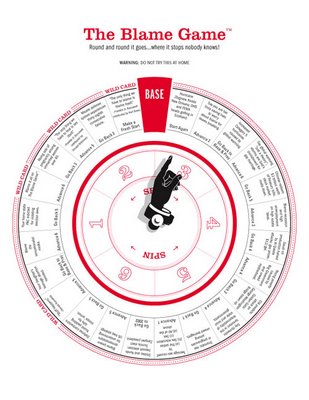
There is crying and gnashing of teeth among some elements of the Republican Party following their rebuke in the midterms.
After minutes upon minutes of soul-searching, Republicans are now in recrimination mode. And the GOP's various factions all agree: This wouldn't have happened if the party had listened to us.
In the aftermath of the historic GOP losses Tuesday night, moderate Republicans quickly concluded that the party needs to be more moderate. Conservative Republicans declared that it should be more conservative. Main Street is angry at Wall Street, theo-cons are angry at neo-cons, and almost everyone is angry at President Bush and the GOP congressional leadership.
The party purges formally began yesterday, as Defense Secretary Donald H. Rumsfeld and House Speaker J. Dennis Hastert (R-Ill.) agreed to step down before they were pushed. Senate Majority Leader Bill Frist (R-Tenn.) had already decided to leave Congress, but GOP insiders said Tuesday's debacle should eliminate him from presidential contention in 2008.
By day's end, Republican fingers had pointed at every conceivable Republican scapegoat: ex-representative Mark Foley of Florida and his scandal-plagued colleagues, Republican National Committee Chairman Ken Mehlman, presidential adviser Karl Rove, even Sen. John McCain of Arizona.
Of course, everyone agrees that Iraq is a huge problem as well, although no one seems to think that getting rid of Rumsfeld will solve it.
The moderate Republican Main Street Partnership fired its first salvo on election night, unleashing a news release titled "Far Right Solely Responsible for Democratic Gains." Sarah Chamberlain Resnick, the partnership's director, complained that GOP leaders had rejected popular causes such as the minimum wage, embryonic stem cell research and lobbying reforms while ignoring health-care issues that did not involve Terri Schiavo. The result, she said, was that moderate suburban voters saw Republicans as extremists.
"This election isn't a repudiation of the GOP," Chamberlain said. "It's a repudiation of a handful of zealots, and a reminder that you can't build a majority party without securing the middle of the American electorate."
Wednesday, November 08, 2006
Republicans Blame Election Losses On Democrats
Allium-sourced report on GOP reaction to midterms:
WASHINGTON, DC--Republican officials are blaming tonight's GOP losses on Democrats, who they claim have engaged in a wide variety of "aggressive, premeditated, anti-Republican campaigns" over the past six-to-18 months. "We have evidence of a well-organized, well-funded series of operations designed specifically to undermine our message, depict our past performance in a negative light, and drive Republicans out of office," said Republican National Committee chairman Ken Mehlman, who accused an organization called the Democratic National Committee of spearheading the nationwide effort. "There are reports of television spots, print ads, even volunteers going door-to-door encouraging citizens to vote against us." Acknowledging that the "damage has already been done," Mehlman is seeking a promise from Democrats to never again engage in similar practices.
WASHINGTON, DC--Republican officials are blaming tonight's GOP losses on Democrats, who they claim have engaged in a wide variety of "aggressive, premeditated, anti-Republican campaigns" over the past six-to-18 months. "We have evidence of a well-organized, well-funded series of operations designed specifically to undermine our message, depict our past performance in a negative light, and drive Republicans out of office," said Republican National Committee chairman Ken Mehlman, who accused an organization called the Democratic National Committee of spearheading the nationwide effort. "There are reports of television spots, print ads, even volunteers going door-to-door encouraging citizens to vote against us." Acknowledging that the "damage has already been done," Mehlman is seeking a promise from Democrats to never again engage in similar practices.
Tuesday, November 07, 2006
U.S. To Send Poll Watchers To 69 Jurisdictions
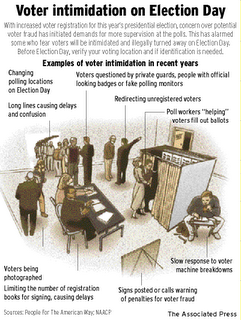
I'm sure these people will be looking for run of the mill voter intimidation and the like.
I doubt, however, that they will be examining the electronic voting paraphernalia.
The Justice Department is dispatching more than 850 people to watch the polls in 69 jurisdictions across the country today, focusing primarily on areas with closely contested races or a high number of minority voters.
The number of poll watchers is a record for Justice and more than twice the number sent during the 2002 midterm elections, officials said yesterday. Justice has sent observers and monitors to polls around the country since the Voting Rights Act of 1965 took effect.
This year's effort targets numerous Democratic-leaning metropolitan areas, including Chicago, Boston, Austin, several counties in the New York City area, the Palm Beach and Fort Lauderdale areas in Florida, the San Francisco Bay area, and the Seattle-Tacoma area in Washington.
Republican-leaning areas are also represented, including Orange County, Calif.; Tuscaloosa, Ala.; and the suburban Houston district previously represented in the House by Tom DeLay.
But no observers are being sent to Missouri, Tennessee or Virginia, where three of the most hotly contested U.S. Senate races will play out.
Nor are observers going to Philadelphia. The Justice Department charged last month that the city has discriminated against Spanish-speaking voters, but an appeals court blocked the placement of monitors at the polls.
The Justice Department said in a news release that the observers will focus on determining whether localities are complying with federal laws forbidding discrimination based on race, disability or language.
About 350 people are monitors employed by Justice, and more than 500 others are observers from other federal agencies, officials said.
More than a dozen of the jurisdictions are on Indian reservations.
Monday, November 06, 2006
Audit Of Capitol Security Upgrade Blocked By Hastert's Office
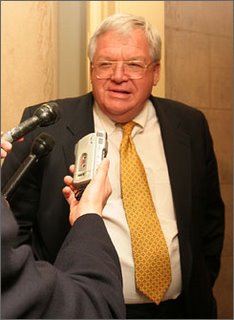
House Speaker Dennis Hastert's office (it is always his office--never him) blocked a probe of contracting malfeasance in a major Capitol security project.
In early 2004, as House Appropriations Committee investigators prepared to launch a sensitive audit of highly classified Capitol Hill security upgrades, Hastert's chief counsel made a surprise visit to the first meeting of the auditors.
His message was clear, according to participants: The speaker's office was not happy about the probe and would keep investigators on a tight leash. In September 2005, despite growing evidence of sweetheart deals, kickbacks, wasteful contracts and shoddy work, the probe was suddenly shut down. ...
Since the Cold War days of the Kennedy administration, a highly secret organization has watched over the security of what is known as the Capitol campus, which includes the Capitol, the House and Senate office buildings and the Supreme Court. That organization got a renewed mission after the Sept. 11, 2001, terrorist attacks, when hundreds of millions of dollars were channeled to it, mostly through the classified "black" budget of the House and Senate defense appropriations subcommittees.
In 2004, the chairmen and ranking Democrats on the House Appropriations Committee and House defense appropriations subcommittees tasked contract investigators to look at contracting on highly classified security upgrades, especially air filtration systems being installed to protect the campus from chemical and biological attack. The scale of the upgrades is unprecedented, and so is the cost, likely to run more than $100 million, according to three different sources close to the project.
Concern had been raised that contracts were being steered to unqualified bidders, who were wooing the secret organization's management with Redskins tickets, expensive lunches, even golf clubs, said Ronald Garant, one of the investigators. But the more pressing issue was sheer waste and incompetence, he said. Another former appropriations committee investigator familiar with the probe said the team was told by a Lockheed Martin contractor that the filtration system being installed in the Ford House Office Building was so shoddy that the children in the building's day-care center would not stand a chance in the event of a chemical or biological attack.
In early 2004, Garant and other investigators went to Arlington to meet with the organization. To their surprise, Van Der Meid, the speaker's chief counsel, made the trip, too. Van Der Meid made it clear from the start that he did not want the probe going forward, according to Garant, a retired, former high-ranking auditor for the Defense Department's comptroller with more than 30 years of experience in government oversight.
Investigators were prevented from talking to key personnel, had access blocked to key facilities and could not inspect the equipment they were supposed to be assessing. After hitting roadblock after roadblock, Robert H. Pearre, the appropriations committee's chief of investigations, delivered the news last September that the investigation had been shut down and its offices in CIA headquarters in Langley, Va., were to be closed.
"We were told, 'Lock the door, change the combination, take your papers, bring them over here. It's all over,' " Garant said.
Sunday, November 05, 2006
How It Looks On The Last Weekend Before The Election

Here's a fairly decent round-up of Tuesday's important House and state governor's races (the Senate races have been pretty well covered all over the place, and are also detailed at the above link).
The Democratic swing in the House is most evident in states east of the Mississippi River, where scandals, retirements and disaffection with the war have combined to put almost three dozen Republican-held seats at risk.
Ohio, the swing state that assured Bush's second-term victory, has turned into a Republican killing field. Republicans face the loss of the governorship and a Senate seat, and five GOP House districts are in danger of switching. Republicans fear the loss of other statewide races and at least one house of the state legislature.
Other GOP danger areas include Pennsylvania, where a Senate seat and five House incumbents are at risk, and Indiana, where Democrats could pick up three House seats. In New York, where Sen. Hillary Rodham Clinton (D) and gubernatorial candidate Eliot L. Spitzer (D) are cruising toward victory, Republicans are defending half a dozen House districts.
In Connecticut, Republicans are deeply worried about veteran Reps. Nancy L. Johnson and Christopher Shays and are only slightly more assured about Rep. Rob Simmons. Johnson appears to be the most endangered of the three. ...
Republicans face difficulties in virtually every region. There are multiple opportunities for Democrats in Florida, Kentucky, Colorado, Minnesota and Arizona. Single seats are at risk of switching in California, Iowa, Idaho, Illinois, North Carolina, New Hampshire, New Mexico, Nevada, Texas, Virginia, Washington and Wyoming.
In addition to the 10 seats likely to fall to Democrats, there are 30 tossup races -- out of 63 competitive races -- in the closing days of the campaign, 29 of them for seats held by Republicans. The lone Democratic-held tossup is in Georgia.
The House has not changed hands without the Senate following suit since the popular election of senators began early in the 20th century. But the odds are steeper for the Democrats in their bid to take over the Senate, because they must win at least four states that Bush carried in 2000 and 2004, three of them with incumbent Republicans. ...
The distemper with Congress has lapped over into the governors' races. Six Republican House members are trying to move up to governors' mansions, and none has a clear path entering the final three days.
Rep. Bob Beaupez (R-Colo.) is badly trailing former Denver district attorney Bill Ritter (D) in Colorado. Rep. Ernest J. Istook Jr. (R-Okla.) is far behind Gov. Brad Henry (D) in Oklahoma, while Rep. Jim Nussle (R-Iowa) is struggling behind the Democratic secretary of state, Chet Culver, in Iowa.
Three House Republicans are in tight gubernatorial races. Rep. Mark Green (R-Wis.) has run neck-and-neck with Wisconsin Gov. Jim Doyle (D) but may have slipped slightly in the final week. Nevada Rep. Jim Gibbons (R) has been hurt by allegations that he sexually assaulted a cocktail waitress, and his race against Democrat Dina Titus is now a tossup. In Idaho, Rep. C.L. "Butch" Otter (R) is in a surprisingly close race with newspaper publisher Jerry Brady (D).
In three key states, Democrats not only are taking the governorship from Republicans but also are poised to roll up majorities that could affect the rest of the ticket.
In New York, Spitzer, the hard-charging attorney general, has not fallen below 66 percent in a public poll since Labor Day in his bid to succeed retiring Gov. George E. Pataki (R).
In Ohio, Republicans have controlled all statewide offices in recent years, but scandals have left retiring Gov. Bob Taft (R) with approval ratings in the teens. Republican secretary of state J. Kenneth Blackwell has struggled to reach 40 percent in his race against Rep. Ted Strickland (D).
In Massachusetts, another state whose governorship Republicans have controlled for more than a decade, Clinton administration assistant attorney general Deval Patrick (D) has a sizeable lead over Lt. Gov. Kerry Healey (R) for the seat of retiring one-term Gov. Mitt Romney (R), who is planning a presidential run in 2008.
Another Republican presidential hopeful, Arkansas Gov. Mike Huckabee, is also likely to see a Democratic successor, with state Attorney General Mike Beebe leading Asa Hutchinson (R), former No. 2 official in the Homeland Security Department.
But Republicans are expected to hold the three big Sun Belt anchors. California Gov. Arnold Schwarzenegger (R) has come back from a drubbing on ballot initiatives a year ago and has a big lead over state Treasurer Phil Angelides. Texas Gov. Rick Perry is trying to fend off a field that includes country singer Richard "Kinky" Friedman.
In Florida, where Gov. Jeb Bush (R) is term-limited, state Attorney General Charlie Crist (R) holds a narrowing lead over Rep. Jim Davis (D) and will get a Monday push from the president, who will campaign in the conservative Florida Panhandle.
Republican hopes of defeating Pennsylvania Gov. Edward G. Rendell and Michigan Gov. Jennifer M. Granholm have soured. Rendell holds a comfortable lead over former Pittsburgh Steelers wide receiver Lynn Swann. Granholm faced a well-funded challenger in businessman Dick DeVos, who sought to capitalize on the state's weak economy. But she has moved ahead in the last month.
In Illinois, U.S. Attorney Patrick J. Fitzgerald has been investigating the administration of Gov. Rod Blagojevich (D) and has indicted his associates, but state Treasurer Judy Baar Topinka (R) has struggled to overcome the barrage of negative advertising unleashed by the governor.
Saturday, November 04, 2006
Bush, Rove Confident GOP Will Hold Both Houses

The publicly displayed over-confidence of George W. Bush and Karl Rove going into next week's midterms is giving a sinister feeling of deja vu to more than one political observer.
Viz:
If Bush is worried, he does not let on. Nor does his top strategist, Karl Rove, who, just as he did in the final stretch before the 2004 election, has made a point in the past few days of appearing jovial and carefree. Wearing a Cheshire cat grin and the same green tie with greyhounds two days in a row, he playfully teased the traveling media, mocking David Gregory's pocket handkerchief and stuffing pieces of white paper in the jacket pockets of other reporters so they would match the NBC correspondent.
Though he did not offer any commentary on the elections, in a conference call with business executives this week Rove outlined five reasons he thinks Republicans will hold Congress, according to a participant: incumbency, more money, better get-out-the-vote organization, the intensity of GOP voters and favorable territory where competitive races are being fought out.
Rove said he was particularly worried about three or four House seats in Indiana and House seats in New York for which top-of-the-ticket Democrats are headed for huge victories, according to the participant. But Rove was optimistic about holding the Florida seat of Republican Mark Foley, who resigned amid a House page scandal, and disparaged Democratic turnout efforts as "sporadic and episodic." ...
Even when a sour note turns up, it is quickly overwhelmed in these Bush bastions. The president made a stop Friday in a jampacked, sweltering high school gymnasium in Le Mars, Iowa, the self-styled ice cream capital of the world. At one point, someone in the crowd held up a painted sign that said "Impeach." Bush supporters pulled it down as the room erupted in boos. Then, following instructions given before the rally for how to drown out hecklers, volunteers started chanting "USA! USA!"
Bush plowed on with his speech as if nothing happened. The crowd responded with raucous applause, cheers and foot-stamping as if rooting their Bulldogs to a basketball title. "Cheerleaders (Heart) Bush," said one sign. In that room, in that moment, at least, the polls seemed far away.
Friday, November 03, 2006
FBI Warned Against Leaking Info On Lawmaker-Related Probes
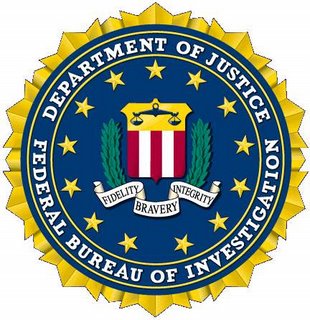
The plethora of corruption cases involving Republicans has gotten so embarrassing to the party that the FBI director is trying to combat the flow of information about the official malfeasance to the press.
Director Robert S. Mueller III of the F.B.I. has issued a stern message to the bureau's nearly 30,000 employees warning them against leaks of confidential information after recent news articles disclosed criminal inquiries involving incumbent lawmakers, mainly House Republicans.
"There have been a number of recent stories in the press attributing sensitive law enforcement information to 'federal law enforcement officials,'" Mr. Mueller said in an Oct. 26 e-mail message. "While I cannot say they have come from F.B.I. employees, such disclosures do serious damage to our investigations and risk unfairly tarnishing the subjects of our investigations who enjoy the presumption of innocence."
In similar election season warnings, senior Justice Department officials sent messages on Wednesday to prosecutors reminding them of departmental rules against leaks. One was sent by Alice S. Fisher, assistant attorney general in charge of the department's criminal division, to prosecutors in her unit. Another was issued by Michael A. Battle, director of the Justice Department office that coordinates with federal prosecutors throughout the country.
Mr. Mueller has tried, during his five-year tenure, to keep a tight lid on the Federal Bureau of InvestigationÂs activities in advance of elections, and is said by some associates to have been "livid" at the recent disclosures. In some cases, the F.B.I. investigations have been made into campaign issues that have threatened the re-election prospects of incumbents.
Thursday, November 02, 2006
"Hacking Democracy" Has An Industry Critic

Diebold doth protest too much, methinks.
Diebold Inc. insisted that cable network HBO cancel a documentary that questions the integrity of its voting machines, calling the program inaccurate and unfair.
The program, "Hacking Democracy," is scheduled to debut Thursday (today), five days before the 2006 U.S. midterm elections. The film claims that Diebold voting machines aren't tamper-proof and can be manipulated to change voting results.
"Hacking Democracy" is "replete with material examples of inaccurate reporting," Diebold Election System President David Byrd said in a letter to HBO President and Chief Executive Chris Albrecht posted on Diebold's Web site. Short of pulling the film, Monday's letter asks for disclaimers to be aired and for HBO to post Diebold's response on its Web site.
According to Byrd's letter, inaccuracies in the film include the assertion that Diebold, whose election systems unit is based in Allen, Texas, tabulated more than 40 percent of the votes cast in the 2000 presidential election.
The letter says Diebold wasn't in the electronic voting business in 2000, when disputes over ballots in Florida delayed President Bush's victory for more than a month and raised questions about the reliability of electronic voting machines.
"We stand by the film," said Jeff Cusson, a spokesman for HBO, which is a unit of Time Warner Inc.
"We have no intention of withdrawing it from our schedule. It appears that the film Diebold is responding to is not the film HBO is airing."
David Bear, a spokesman for Diebold, said the company bought another firm, Global Elections, in 2002 that served about 8 percent of balloting in 2000, including voters in Florida. The company, which hasn't seen the film, based its complaints on material from the HBO Web site, Bear said.
This is Diebold's second recent defense of its system. On Sept. 26, Byrd wrote to Jann Wenner, editor and publisher of Rolling Stone, saying a story written by Robert F. Kennedy Jr., "Will the Next Election Be Hacked?" was "error-riddled" and that readers "deserve a better researched and reported article."
The HBO documentary is based on the work of Bev Harris, the Renton woman who founded BlackBoxVoting.org, which monitors election accuracy. In 2004 the attorney general of California took up a whistle-blower claim filed by Harris against Diebold and settled with the company for $2.6 million in December.



